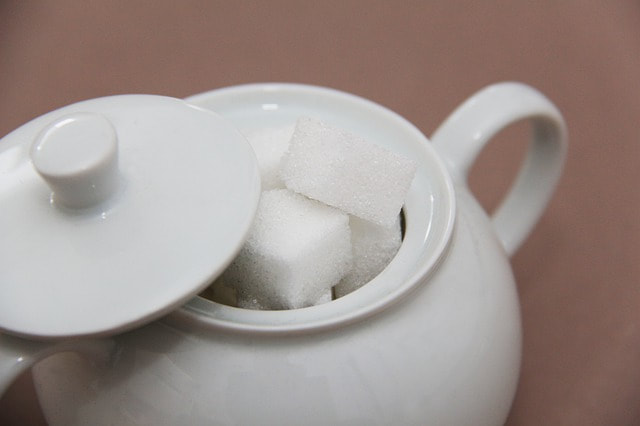CBN Medical Reporter Lorie Johnson blogs, "It's great that more people are now recognizing the harmful effects of consuming too much sugar. This bad habit leads to obesity and diabetes. Eating or drinking too much sugar also causes inflammation, which leads to heart disease, cancer, arthritis, and other health problems.
Clearly, the best way to eliminate sugar from our diets is to stop eating and drinking anything that tastes sweet. We will go through a withdrawal period from three days to a week, which can be difficult. But I'd like to encourage you to exercise self-control and stick with it, because after that, we no longer crave sweet foods, which is a joyful, liberating way to live.
Unfortunately, many people who recognize the dangers of sugar opt to take what appears to be the easy route, which in reality, is more difficult. They choose to replace sugar with sugar substitutes, which cause all kinds of problems including weight gain.
There are dozens of sugar substitutes on the market, and the number keeps growing. This is because food manufacturers recognize that people are always looking for that magic bullet: a sweetener that tastes just like real sugar, but doesn't have the consequences of sugar.
IT DOESN'T EXIST. Nevertheless, manufacturers keep claiming they've come up with a sugar substitute that satisfies all our desires, and people fall for it.
There are a number of reasons why we should avoid sugar substitutes. The most glaring is the fact that sweets are addictive. No matter what kind of sweet taste you lay on your taste buds, it's going to make you crave more sweet. So if you are drinking a diet soda, for instance, loaded with artificial sweetener, you may feel proud of yourself because you think you're beating the system: there are no calories and you still get to enjoy that sweet taste.
But what is actually happening, is you are programming your brain to call for more sweets, such as that piece of chocolate cake in the office break room, that candy bar at the check-out counter, or those doughnuts as you drive past Krispy Kreme. Eventually, you will give in.
Several studies, including one conducted at Purdue University, conclude artificial sweeteners actually lead to weight gain, because they lead to overindulgence on real sweets.
Aside from weight gain, there are a number of other troubling health problems associated with sugar substitutes, such as that they feed the bad bacteria in the gut. Health professionals only recently discovered that the trillions of bacteria in our small intestine, also known as the gut, determine our overall health.
In fact, 70 percent of our immune system is located in our gut. That's why having lots of good bacteria is vitally important, and why taking a probiotic supplement, which increases the number of good bacteria, is such a good idea. Conversely, as it turns out, artificial sweeteners feed the bad bacteria in the gut.
Other concerns are that sugar substitutes impair glucose and insulin regulation.
Most people are confused about the various types of sugar substitutes. While, as I mentioned above, it's best to avoid all sweeteners, both real and artificial, many people reject that notion and are determined to find a sugar substitute that doesn't have the calories of sugar, but does have the taste, and in the process, want to choose the healthiest one.
So here goes:
Clearly, the best way to eliminate sugar from our diets is to stop eating and drinking anything that tastes sweet. We will go through a withdrawal period from three days to a week, which can be difficult. But I'd like to encourage you to exercise self-control and stick with it, because after that, we no longer crave sweet foods, which is a joyful, liberating way to live.
Unfortunately, many people who recognize the dangers of sugar opt to take what appears to be the easy route, which in reality, is more difficult. They choose to replace sugar with sugar substitutes, which cause all kinds of problems including weight gain.
There are dozens of sugar substitutes on the market, and the number keeps growing. This is because food manufacturers recognize that people are always looking for that magic bullet: a sweetener that tastes just like real sugar, but doesn't have the consequences of sugar.
IT DOESN'T EXIST. Nevertheless, manufacturers keep claiming they've come up with a sugar substitute that satisfies all our desires, and people fall for it.
There are a number of reasons why we should avoid sugar substitutes. The most glaring is the fact that sweets are addictive. No matter what kind of sweet taste you lay on your taste buds, it's going to make you crave more sweet. So if you are drinking a diet soda, for instance, loaded with artificial sweetener, you may feel proud of yourself because you think you're beating the system: there are no calories and you still get to enjoy that sweet taste.
But what is actually happening, is you are programming your brain to call for more sweets, such as that piece of chocolate cake in the office break room, that candy bar at the check-out counter, or those doughnuts as you drive past Krispy Kreme. Eventually, you will give in.
Several studies, including one conducted at Purdue University, conclude artificial sweeteners actually lead to weight gain, because they lead to overindulgence on real sweets.
Aside from weight gain, there are a number of other troubling health problems associated with sugar substitutes, such as that they feed the bad bacteria in the gut. Health professionals only recently discovered that the trillions of bacteria in our small intestine, also known as the gut, determine our overall health.
In fact, 70 percent of our immune system is located in our gut. That's why having lots of good bacteria is vitally important, and why taking a probiotic supplement, which increases the number of good bacteria, is such a good idea. Conversely, as it turns out, artificial sweeteners feed the bad bacteria in the gut.
Other concerns are that sugar substitutes impair glucose and insulin regulation.
Most people are confused about the various types of sugar substitutes. While, as I mentioned above, it's best to avoid all sweeteners, both real and artificial, many people reject that notion and are determined to find a sugar substitute that doesn't have the calories of sugar, but does have the taste, and in the process, want to choose the healthiest one.
So here goes:
Monk Fruit is the best sugar substitute. It's been used in China for centuries to treat obesity and diabetes. In fact it's true name is "Lo Han." It's loaded with antioxidants and has no calories. But good luck finding it. If you happen to see a product advertised as Monk Fruit, check the label. Chances are, it contains very little Monk Fruit and a lot of additives, such as sugar alcohols, which are problematic.
The same goes for Stevia, which is a natural sweetener from the leaves of the Stevia Rebaudiana plant. It's natural and has no calories. It does not raise blood sugar. That sounds great, in its pure form. But the reality is, like Monk Fruit, most Stevia products contain all kinds of harmful additives.
Many of the additives we see in sugar substitutes are in the form of sugar alcohols. These are easily recognized as ingredients ending in "ol," such as Erythritol and Xylitol. While these sweeteners are natural, and aren't nearly as bad as the chemical ones made in a lab that cause all kinds of horrendous reactions, sugar alcohols still carry with them some serious complications.
The main one is that they can have a laxative effect. That means you can expect gastric distress, such as bloating, intestinal gas and diarrhea. Is that sweet tea worth it? Try unsweetened. You'll get used to it and feel so much better. I've been drinking my coffee black for years and I (have learned to) love it that way!
Finally, whatever you do, steer clear of the artificial sweeteners. These are the chemicals that are completely foreign to your body, and therefore your system doesn't know how to process them. They go by names like Aspartame, Saccharin, and Sucralose. You will find those in literally hundreds of diet products and items labeled "sugar-free."
So to truly get sugar out of your life, which is an admirable goal, remove the taste of sweet from your taste buds.
Suffer through the short withdrawal period, and you'll no longer crave those foods that are so unhealthy. Then on that rare occasion when you have something sweet, such as a piece of fruit, it will seem tremendously sweet, like candy, which is the way it's supposed to be."
*Always seek the advice of your physician or other qualified healthcare provider before starting any new treatment or discontinuing an existing treatment. Talk with your healthcare provider about any questions you may have regarding a medical condition.
The same goes for Stevia, which is a natural sweetener from the leaves of the Stevia Rebaudiana plant. It's natural and has no calories. It does not raise blood sugar. That sounds great, in its pure form. But the reality is, like Monk Fruit, most Stevia products contain all kinds of harmful additives.
Many of the additives we see in sugar substitutes are in the form of sugar alcohols. These are easily recognized as ingredients ending in "ol," such as Erythritol and Xylitol. While these sweeteners are natural, and aren't nearly as bad as the chemical ones made in a lab that cause all kinds of horrendous reactions, sugar alcohols still carry with them some serious complications.
The main one is that they can have a laxative effect. That means you can expect gastric distress, such as bloating, intestinal gas and diarrhea. Is that sweet tea worth it? Try unsweetened. You'll get used to it and feel so much better. I've been drinking my coffee black for years and I (have learned to) love it that way!
Finally, whatever you do, steer clear of the artificial sweeteners. These are the chemicals that are completely foreign to your body, and therefore your system doesn't know how to process them. They go by names like Aspartame, Saccharin, and Sucralose. You will find those in literally hundreds of diet products and items labeled "sugar-free."
So to truly get sugar out of your life, which is an admirable goal, remove the taste of sweet from your taste buds.
Suffer through the short withdrawal period, and you'll no longer crave those foods that are so unhealthy. Then on that rare occasion when you have something sweet, such as a piece of fruit, it will seem tremendously sweet, like candy, which is the way it's supposed to be."
*Always seek the advice of your physician or other qualified healthcare provider before starting any new treatment or discontinuing an existing treatment. Talk with your healthcare provider about any questions you may have regarding a medical condition.



 RSS Feed
RSS Feed